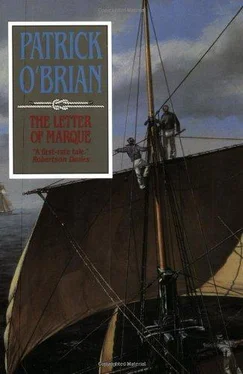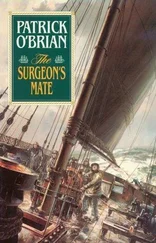Patrick O'Brian - The Letter of Marque
Здесь есть возможность читать онлайн «Patrick O'Brian - The Letter of Marque» весь текст электронной книги совершенно бесплатно (целиком полную версию без сокращений). В некоторых случаях можно слушать аудио, скачать через торрент в формате fb2 и присутствует краткое содержание. Жанр: Книги. Описание произведения, (предисловие) а так же отзывы посетителей доступны на портале библиотеки ЛибКат.
- Название:The Letter of Marque
- Автор:
- Жанр:
- Год:неизвестен
- ISBN:нет данных
- Рейтинг книги:3 / 5. Голосов: 1
-
Избранное:Добавить в избранное
- Отзывы:
-
Ваша оценка:
- 60
- 1
- 2
- 3
- 4
- 5
The Letter of Marque: краткое содержание, описание и аннотация
Предлагаем к чтению аннотацию, описание, краткое содержание или предисловие (зависит от того, что написал сам автор книги «The Letter of Marque»). Если вы не нашли необходимую информацию о книге — напишите в комментариях, мы постараемся отыскать её.
The Letter of Marque — читать онлайн бесплатно полную книгу (весь текст) целиком
Ниже представлен текст книги, разбитый по страницам. Система сохранения места последней прочитанной страницы, позволяет с удобством читать онлайн бесплатно книгу «The Letter of Marque», без необходимости каждый раз заново искать на чём Вы остановились. Поставьте закладку, и сможете в любой момент перейти на страницу, на которой закончили чтение.
Интервал:
Закладка:
For the last few minutes Jack's heart had been beating with steadily greater strength and speed and now it seemed to fill his chest. Breathing deeply and controlling the pitch of his voice with some success he said 'Does that mean I may be reinstated?'
'If there were any justice in the world, I am sure it would, my dear," said Stephen. 'But you must not look for it with any kind of certainty - never with any kind of strong hope at all. Ledward and Wray have not been taken: they cannot be brought to trial. It is not impossible that someone more highly-placed than either is protecting them: certainly there is a strange reluctance to move ... In any event the Ministry has no wish to offer the opposition a blazing and most discreditable scandal; and raison d'etat may very easily outweigh wrongs inflicted upon an individual, particularly an individual with no political interest: or even indeed with the reverse, for in that respect you will allow me to say that General Aubrey is a sad handicap. Then again all authority implies an extreme reluctance to admit past error. On the other hand I believe a friend would advise you not to despair; above all not to give way to melancholy - be not idle, be not alone, as dear Burton says. For activity, naval activity is the solution, if solution there be.'
'I am sorry if I seemed so hipped this morning,' said Jack. 'The fact of the matter is -i do not mean to complain, Stephen, but the fact of the matter is, I had just had a dream so real and true that even now I can touch it. The dream was that the whole affair, the trial and everything that followed, was itself a dream; and my huge relief, my joy at realizing this, my immense happiness I think it was that woke me. But even then I was still partly in the dream and for a moment I looked confidently for my old uniform coat." He dipped his oars and completed his circle round the ship, looking attentively at her trim: his reason acquiesced in everything Stephen had said, but in his irrational part a very small glow was dissipating the most extreme unhappiness.
As he pulled towards the frigate he said, 'I am glad you saw Duhamel again. I liked him.'
'He was a good man,' said Stephen. 'And restoring this diamond when he was cutting all ties with his own country -going to Canada - was as striking an example of liberal behaviour as I can recall. I regret him much.'
'He is not dead, poor fellow?'
'I should not have mentioned his name if he had been living. No. Heneage Dundas, on my guarantee, was to carry him to America, where he meant to settle by the bank of a trout-stream in the province of Quebec. He had changed all his not inconsiderable fortune into gold, which he carried in a belt about his waist; he went aboard at Spithead in a turbulent sea, and as I have sometimes done he slipped between the boat and the side: his fortune sunk him without the least hope of recovery.'
'I am heartily sorry for it,' said Jack, and rowed a little harder. He wondered whether he might speak of Diana and her diamond - it seemed inhuman not to do so - but he decided that the matter was altogether too delicate. He might easily be laid by the lee; he might easily give pain; and silence was better until Stephen should mention her again.
When they were aboard the ship once more he sent the other targets out. The larboard watch had their turn with the guns - a slightly more creditable performance, accompanied by a running fire of criticism, advice and even praise from the quarterdeck - and then the Surprise was indulged in two broadsides at much closer range. They were rippling broadsides, the guns firing in succession from forward aft, because her timbers were too old for the simultaneous crash except in great emergency; but private ships of war had to find themselves in powder, that costly substance, so in most of them broadsides, rippling or otherwise, were extremely rare; and all hands perceived these as a celebration of their triumph over the Viper. The celebration ended with the captain and the gunner firing the bow-chasers, two very finely-bored long brass nines, strikingly accurate far-carrying guns, Jack Aubrey's private property. They fired at the floating remains of the target shattered by the broadsides, and although neither did spectacularly well, they raised a fervent cheer. As Jack came aft, wiping the powder-marks off his face, Martin said to Stephen, 'Surely the Captain is looking more himself, do not you think? Yesterday evening I was extremely shocked.'
The extreme edge of unhappiness might have gone, but there was still room for a very great deal of worry and anxiety. Quite apart from his strongly intrusive necessary reflections upon domestic and legal complications (and he was not the resilient, sanguine being of even a year ago), Jack had not realized the difficulty, the near impossibility, of recruiting a ship's company of much the same quality throughout. He had not realized how very far years of team-work and constant practice on the same gun with the same partners had raised the old Surprises beyond the common level. The privateersmen were strong and willing; in dumb-show - the ordinary form of exercise, powder being so dear - they could rattle the guns in and out with great force and spirit; but it was clear that months or even years would be needed to give them that perfect timing, coordination and economy of effort that made the regular Surprises so dangerous to their enemies. In the meantime he could either restore the guns to their former crews or he could change his strategy, and instead of weakening his opponent from a distance, perhaps even knocking a topmast away, before manoeuvring to cross his bow or stern for a raking broadside and then if necessary boarding, he could follow Nelson's advice about 'going straight at 'em'. But that advice was given early in the last war, when French and Spanish gunnery, French and Spanish seamanship were so markedly inferior; at present a ship bearing down with a light breeze over a smooth sea would be exposed, head-on and unable to reply, to the enemy's full broadside for twenty or thirty minutes, and she might well be so mangled by the time she came alongside that she would herself be taken - the biter bit. Then again he had worked out his practice when he was commanding a King's ship, always happy of course to take an enemy merchantman or privateer but primarily intended to take, burn, sink or destroy the enemy's national ships of war. Now the case was altered: now his chief prey was to be merchantmen or privateers, undamaged if possible; and that called for a different approach. Of course, of course, three times of course he would delight in an engagement with an opponent of equal strength belonging to the French or American navy, a hard-hitting battle with no notion of financial gain: for a discarded privateer to take an enemy frigate would be glory indeed. But unhappily the Surprise, though fast and weatherly, belonged to a former age as far as glory was concerned. There were only five twenty-eight-gun frigates left in the Royal Navy and of these five, four were laid up in ordinary, unused. Most frigates now displaced well over a thousand tons and carried thirty-eight eighteen-pounders as well as carronades, and the Surprise could no more have tackled one of them than she could have faced a ship of the line. She gauged less than six hundred tons; she carried twelve-pounders (and if her knees had not been specially strengthened to bear them she would have been happier with nines); and even with her full extravagant Royal Navy complement she had fewer than two hundred men as opposed to the more than four hundred in one of the big Americans. Yet she was still a frigate, and for her there would be no glory in capturing anything of nominally inferior rank, such as the heavier post-ship and any of the sloops, ship-rigged or otherwise.
'Perhaps it would be better to go back to carronades,' he reflected. At one time the Surprise, apart from her chasers, had been armed entirely with carronades, those stumpy little objects, more like a mortar than a gun, which were light (a carronade throwing a thirty-two pound ball weighed only seventeen hundredweight as opposed to the twelve-pounder long gun's thirty-four) and easily managed. That gave the ship a broadside weight of metal of 456 pounds. To be sure, the 456 pounds could not be thrown very accurately, nor very far; these were short-range weapons. Yet a carronade did not require great skill in the handling; and although its massive balls had a terrible smashing effect, liable to ruin or even sink a prize, the same weapon loaded with case-shot cut up the enemy's rigging and cleared his open decks most efficiently, above all if they w^re crowded with men intending to board. Counting four hundred shot to a canister, with a broadside of fourteen carronades, that came to more than four thousand; and four thousand iron balls screaming across the deck at 1674 feet a second had a discouraging effect, even if they were fired by inexpert hands... perhaps that was the right solution, although of course it did away with all the finer points of a single-ship action, the high seamanship of manoeuvring for position, the deliberate firing of the most accurate guns separately at very long range, the rate of fire increasing as the range shortened until they were hammering it out yardarm to yardarm in the paroxysm of battle - an incessant roaring in deep clouds of smoke. 'But that belongs to an almost entirely different world,' he reflected, 'and I can hardly hope to be so fortunate as to know it again. Yet I believe I shall open my mind to Stephen.'
Читать дальшеИнтервал:
Закладка:
Похожие книги на «The Letter of Marque»
Представляем Вашему вниманию похожие книги на «The Letter of Marque» списком для выбора. Мы отобрали схожую по названию и смыслу литературу в надежде предоставить читателям больше вариантов отыскать новые, интересные, ещё непрочитанные произведения.
Обсуждение, отзывы о книге «The Letter of Marque» и просто собственные мнения читателей. Оставьте ваши комментарии, напишите, что Вы думаете о произведении, его смысле или главных героях. Укажите что конкретно понравилось, а что нет, и почему Вы так считаете.












